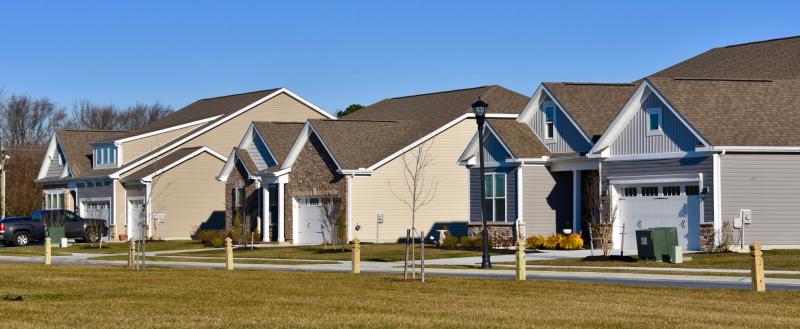Sussex County Planning and Zoning Commission will allow more public comment on a proposed memorandum of understanding between the county and Delaware Department of Transportation. Already nearly five hours into its Dec. 12 meeting, the commission voted to recess the hearing and place the memorandum on its Thursday, Jan. 9 agenda.
The proposal is expected to give county officials more say in road improvements tied to land-use applications, expanding an existing agreement to include all county land-use applications. The current agreement, dating back to 1988, applies only to rezoning applications. The proposed agreement includes rezoning, subdivision, residential-planned-community and conditional-use applications.
Assistant county attorney Vince Robertson called the memorandum a working document. “It's not set in stone. We need feedback,” he said. “I want to make it clear that Sussex County will make all decisions on land use; the buck stops with Sussex County. DelDOT provides information to make decisions.”
Commissioners questioned the roles of DelDOT and Sussex County officials.
“You can't say Sussex County is not involved with traffic,” Robertson said. “DelDOT is neutral. They tell you if you approve an application, this is what needs to be done.”
Commissioner Kim Hoey Stevenson suggested the county hire its own traffic engineer. That sentiment was also expressed by several residents who spoke during the hearing.
Public comment: Revisions needed
Jeff Stone, representing Sussex Alliance for Responsible Growth, said the proposed agreement gives too much authority to DelDOT. He said the organization has provided 40 comments, suggestions and questions about the memorandum.
He said the document should be written so it's easy to read and understand. “Getting this right is critical to Sussex County. We have an opportunity to reverse some trends,” he said.
“A transportation planner should be under consideration. Everything you hear is traffic, traffic, traffic,” Stone said.
“That's why we have DelDOT,” Robertson said.
“They got us into the situation we are in today,” Stone responded.
SARG contends county officials have the responsibility and authority to set requirements in the traffic-impact study scoping process but are unwilling to do so,
Keith Steck of Milton said the memorandum is a start but must be revised.
Steck said only two references are made to safety, and there is no mention of pedestrian or bicyclist safety or emergency response times in the memorandum. “Safety should be in bold letters,” he said. “This is essential to any memorandum.”
He said the proposed agreement only deals with vehicular traffic and excludes buses, bikes, motorcycles and trucks. It does not take into consideration all zoning districts, including industrial zones, he said.
“It needs to be clearer so all can understand it,” Steck said.
Laurel contractor Robert Horsey said Sussex County officials should not be at the table when DelDOT officials and developers discuss proposed road improvements and costs. “Sussex County should not be there unless you are contributing to projects. DelDOT can communicate to you,” he said.
Horsey said if phasing is part of the memorandum, it should be tied to building permits.
“This is not an end-all fix for Sussex County,” Horsey said. “It's not fair that all cost is placed on the landowners and developers. You should lobby state legislators for a gas tax to pay for roads. That's the most equitable solution.”
Bob Viscount of Lewes said county officials should not give DelDOT a free hand. “You can't defer to this agency all the time. You need your own transportation expert. You need knowledge to interact with DelDOT, or they will defer to what's good for DelDOT,” he said.
He said the memorandum contains a high level of ambiguity and is already antiquated.
Sussex County Council will have a public hearing on the memorandum at 1:30 p.m., Tuesday, Jan. 28, 2020, in the county administration building, 2 The Circle, Georgetown.
The proposed memorandum
DelDOT officials would provide a preliminary traffic analysis for all land-use applications to determine whether the traffic impact would be rated diminutive, negligible, minor or major. That finding would trigger three possible actions – a traffic-impact study, traffic-operational analysis or a fee charged to developers in lieu of a study.
All road improvements related to an application would strive to maintain a level of service D for traffic in the area. If the existing level of service is below D, at E or F, that level of service would have to be maintained. Transportation officials rank level of service at intersections based on traffic delay times from A to F.
No public hearing would be conducted until Sussex County officials receive at least one of the following: an approved traffic-impact study from DelDOT; an approved traffic-operational analysis from DelDOT; a fee in lieu of road improvements approved by DelDOT; or the application has been determined to have a diminutive impact.
Another key component would be possible phasing of land development by DelDOT to maintain a level of service D at nearby intersections. Sussex County officials would then be advised to incorporate phasing during their deliberations on an application. Phasing as a condition of approval would be a county decision.
Phasing of a project could include a delay of all or part of development until specific highway improvements are made by DelDOT or developers. Phasing could also depend on whether required road improvements would be funded by DelDOT or constructed at a developer's expense.
Other proposed provisions:
• Sussex County officials – including the county administrator, planning and zoning director, and attorneys – would be allowed to participate in negotiations between developers and DelDOT officials on roadway improvements. County officials could provide input, but DelDOT officials would make the final determination on all agreements and road improvements by a developer.
• Agreements and any subsequent changes to agreements with developers would immediately be forwarded to Sussex County planning and zoning staff to be part of the public record.
• If an application is in a transportation improvement district, the requirements of the district would supersede requirements in the memorandum.





















































